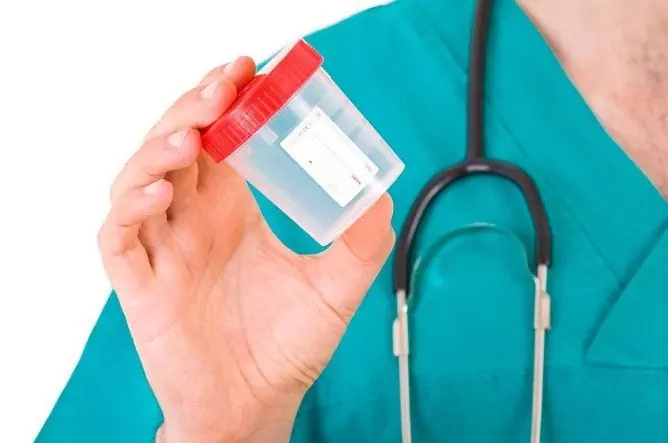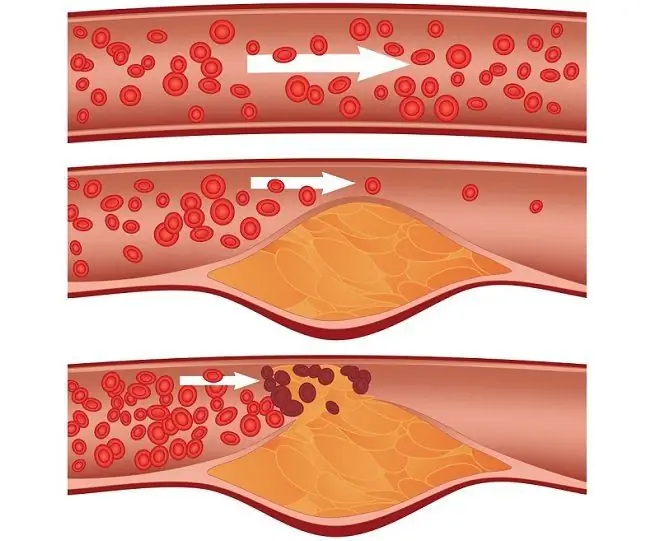- Author Rachel Wainwright wainwright@abchealthonline.com.
- Public 2023-12-15 07:39.
- Last modified 2025-11-02 20:14.
Oliguria
The content of the article:
- Forms
- Oliguria reasons
- Oliguria symptoms
- Diagnostics
- Treatment of oliguria
- Prevention
- Consequences and complications
Oliguria is a decrease in daily urine output (the amount of urine excreted per day) to 30% of the age norm with normal fluid intake and normal extrarenal water loss (i.e., through the lungs, skin, etc.). Oliguria is not an independent disease, it is a symptom that may indicate the presence of a serious pathology. It is characteristic of both diseases of the urinary system and some other diseases of the internal organs.

Oliguria is characterized by a decrease in urine released per day by a third of the norm
Normally, the daily amount of urine in an adult is 1-1.5 liters. This indicator varies depending on the person's age, gender, weight, diet and the amount of fluid consumed. With oliguria, the amount of urine excreted decreases to 400-500 ml per day. False oliguria is characterized by a physiological decrease in urine output due to reasons not associated with the pathology of internal organs.
Forms
Oliguria is divided into pathological (true), physiological (due to physiological changes in the body) and false, not associated with defects in the formation and excretion of urine.
Depending on the reasons:
- prerenal oliguria;
- renal;
- post-renal.
Oliguria reasons
Physiological oliguria often develops during pregnancy due to compression of the ureters by the enlarging uterus and increased tissue hydrophilicity.
Physiological oliguria in children in the first days of life is a feature of the neonatal period.
False oliguria is due to two reasons:
- insufficient intake of fluid into the body;
- increased fluid consumption by the body, for example, with increased sweating in the hot season, during sports, etc.
More often, false oliguria is caused by a combination of causal factors, i.e., increased consumption of fluid by the body when it is insufficiently supplied.

False oliguria can occur due to intense physical activity and limited fluid intake
False oliguria is often caused by mental factors, for example, a diet with a targeted reduction in the amount of fluid consumed (psychogenic oliguria). In some cases, it can be iatrogenic - due to medical necessity, for example, fluid intake is reduced with late toxicosis (gestosis) of pregnant women, nephrotic syndrome, pancreatitis.
Another reason for false oliguria may be an unnatural exit of urine, which is observed with perforation of the bladder neoplasm, the imposition of an artificial urinary tract from the kidney (nephrostomy).
The development of false oliguria in children is facilitated by long walks, too warm clothes, high air temperature in the room where the child is for a long time.
False oliguria is capable of becoming true.
The reasons contributing to the development of oliguria are divided into three main groups:
- prerenal;
- renal;
- post-renal.
Prerenal reasons include:
- blood loss;
- burns;
- infectious diseases;
- diseases of the cardiovascular system;
- intestinal obstruction;
- prolonged diarrhea;
- repeated vomiting;
- profuse sweating;
- prolonged fasting.
Renal (renal) causes of oliguria:
- acute renal failure;
- poisoning with nephrotoxic substances;
- severe kidney injury;
- hemolytic syndrome;
- glomerulonephritis;
- acute pyelonephritis;
- blockage of the renal veins;
- side effects from taking medications.
For post-renal reasons oliguria include:
- bladder cancer;
- prostatitis;
- blockage of the urinary tract (stone, neoplasm, blood clots, etc.);
- strictures (narrowing) of the urethra;
- trauma to the urinary tract during childbirth; etc.

Prostatitis can cause oliguria in men
Pathological oliguria can also develop due to narrowing of the pylorus of the stomach (pyloric stenosis), acute inflammation of the small and large intestines, intestinal obstruction, and high fever.
Oliguria symptoms
The main symptoms of oliguria are a decrease in the amount of urine excreted less than 400 ml per day (less than 20 ml per hour) and signs accompanying the developing disturbance of the water-salt balance. This condition also provokes an exacerbation of the symptoms of the underlying disease. In addition to actually reducing the amount of urine, oliguria is characterized by the following manifestations:
- hematuria;
- lowering blood pressure;
- increased body temperature, fever;
- nausea, vomiting;
- diarrhea;
- pain in the lower back and / or in the abdomen;
- pain and / or pulling sensation during urination;
- the appearance of edema.
A decrease in the amount of daily urine against the background of insufficient fluid intake, increased sweating, as well as for a number of other reasons that may explain the decrease in daily urine output, is the main symptom of false oliguria. This condition is accompanied by dry mouth, dizziness, deterioration in general well-being, weakness, and intense thirst.
Diagnostics
In order to diagnose oliguria, anamnesis, a complete blood count, and a physical examination are carried out. Taking anamnesis and clarifying the factors preceding the appearance of oliguria make it possible to differentiate true oliguria from false.

Functional examination of urine is carried out with suspicion of pathological oliguria
If a pathological oliguria is suspected, a laboratory and instrumental examination is carried out, which, according to indications, includes:
- general and biochemical blood test;
- general and biochemical analysis of urine;
- functional urine tests (Zimnitsky test, Nechiporenko test, etc.);
- determination of the volume of circulating blood;
- ultrasound examination of the kidneys and urinary tract;
- computed tomography with contrast agent or magnetic resonance imaging of the abdominal and pelvic organs;
- radionuclide study of the morphofunctional state of the kidneys and urinary tract;
- electrocardiogram;
- diuretic test.
Treatment of oliguria
Treatment of oliguria is aimed at restoring water and electrolyte balance, normal blood circulation and correcting the developed disorders. In the future, therapy is carried out for the underlying disease, which caused the development of this condition.
In some cases, hospitalization of the patient and intravenous administration of balanced salt solutions are necessary. In severe cases, hemodialysis may be required.
With the prerenal form of the disease, adult patients are shown taking diuretic drugs. However, until the reasons for the development of oliguria are established, the forced diuresis method is not used.
In case of impaired renal perfusion, blood pressure is normalized to correct it, and vasodilators are used if necessary.

Severe oliguria may require hemodialysis
With oliguria of infectious etiology, antibacterial therapy is indicated. The choice of a drug depends on the type of the main infectious agent detected during the diagnostic process and the results of the antibiogram.
Self-medication of oliguria with drugs is dangerous by changing the clinical parameters of urine, which can lead to an erroneous diagnosis.
In some cases (with acute pyelonephritis, glomerulonephritis, etc.), in addition to drug treatment, a diet is prescribed - table No. 7 according to Pevzner.
With the postrenal form of pathology, surgical treatment is indicated.
To eliminate false oliguria, it is enough to replenish the required level of fluid in the body. The most suitable for this are saline solutions, for example, Rehydron solution or slightly salted water (they allow you to quickly normalize the water-salt balance). You should not drink tonic drinks (strong tea, coffee, tonics), because although they contribute to an increase in urination, this happens due to even greater dehydration of the body.
Prevention
The main measures to prevent oliguria include:
- timely treatment of diseases of the urinary system and other diseases of internal organs;
- an immediate visit to a doctor if you suspect a decrease in the amount of urine excreted;
- drinking enough fluids;
- refusal of self-medication with medications.
In case of physiological oliguria of pregnant women, preventive measures are selected individually by the doctor supervising the pregnancy. Such measures include the control of fluid and salt intake, systematically used semi-fasting days, etc.

To prevent false oliguria, you need to monitor water consumption during exercise.
For the prevention of false oliguria, the daily amount of fluid consumed should be monitored, if necessary, increasing it depending on the conditions, including the volume and intensity of physical activity.
Consequences and complications
In the absence of timely adequate treatment, oliguria can lead to a complete cessation of urine output (anuria), which poses an immediate threat to life.
Uncontrolled intake of diuretics by patients with oliguria can contribute to the development of acute renal failure, which is also highly likely to cause death.
Oliguria in nephrotic syndrome indicates the severity of the patient's condition - the less urine is produced during the day, the more severe the condition of the kidneys. Severe oliguria is dangerous because damaged kidney tissue may not recover even after correction of the condition, and the patient will need hemodialysis or kidney transplantation.

Anna Aksenova Medical journalist About the author
Education: 2004-2007 "First Kiev Medical College" specialty "Laboratory Diagnostics".
The information is generalized and provided for informational purposes only. At the first sign of illness, see your doctor. Self-medication is hazardous to health!






